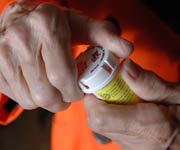The study also found women who underwent screening within a 12-month period had fewer broken bones particularly forearm fractures.
Dr Emma Clark, Arthritis Research UK Clinician Scientist Fellow at the University of Bristol, who carried out the research, said: “These findings provide powerful evidence that this screening programme should be rolled out nationally to identify who should have a spinal x-ray to diagnose a vertebral fracture. At the moment, less than a third of women with vertebral fractures are diagnosed and treated properly.”
Dr Clark in the University’s School of Clinical Sciences revealed her findings at the annual meeting of the American Society for Bone and Mineral Research in San Diego at the weekend.
Osteoporotic spine (vertebral) fractures are common in the elderly and often signal an increased risk of further fractures. Drugs known as bisphosphonates are available to reduce this future fracture risk by approximately 50 per cent. Yet despite this there are no national screening programmes to identify people with vertebral fractures, in primary care.
The main reason is the current lack of clear triggers identifying people who may have a vertebral fracture and sending them for diagnostic spinal x-rays.
The study enrolled 3,200 women born between 1927 and 1941 from GP practice lists in the Bristol area and randomly assigned to two groups; an intervention arm and a control arm. The intervention group received a simple 15-minute screening by a practice nurse and if found to be at high risk of vertebral fractures they had a spinal x-ray; those randomised to the control arm received current standard methods to identify women at high risk of vertebral fractures but received no active intervention.
The screening tool used four indicators - height loss, history of non-vertebral fractures, back pain score and rib to pelvis distance.
